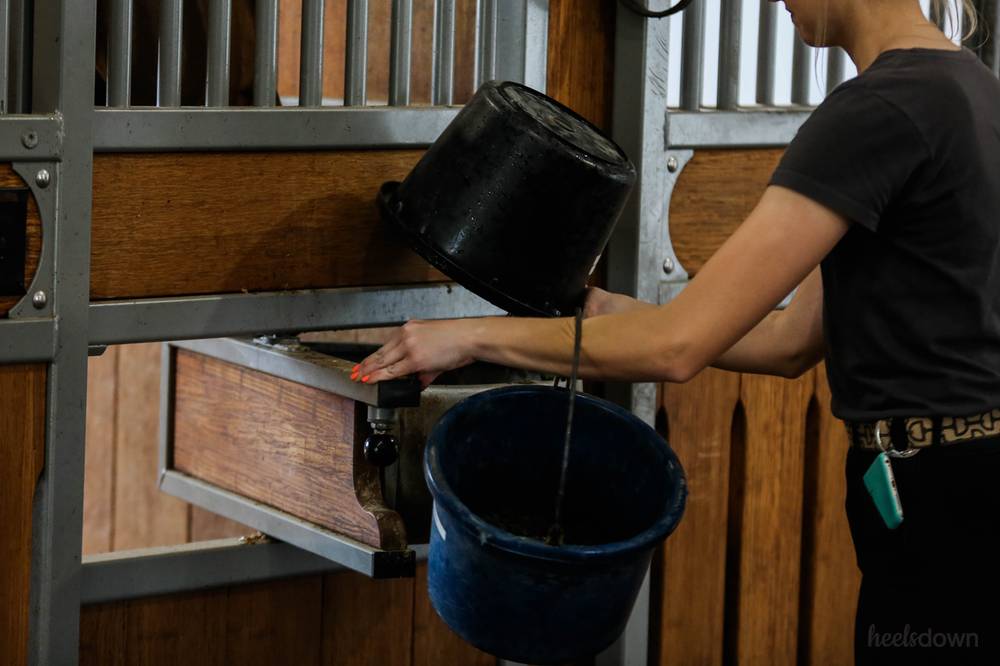Feeding For Performance: What Horse Owners Really Need to Know

Selecting the right diet formula for a performance horse can be a tricky game for horse owners. With so many options out there for forage, grain and supplements, cutting through the clutter to strike the right balance for any one individual horse takes some thought.
Dr. Anna Pesta, a nutritionist on the equine technical solutions team at Purina Animal Nutrition, stopped by to chat with our hosts on the Heels Down Happy Hour Podcast to discuss this very topic. Here are some the highlights she shared about considering the right diet for the performance horse.
What are the most important nutrients to consider when feeding for athletic performance?
Dr. Pesta: Calories have to come first because we need to provide the horse with enough energy to do his job and look good doing it. That might be a little simplistic, but I often start by asking riders how do you feel your horse looks and how is he riding? That gives me a good idea of if we’re at least supplying the right number of calories and then we can tweak the diet within that possibly adjusting the fuel mix a little to get the right feel. Then we move on to looking at the amount of protein he’s getting and making sure the amino acid balance is strong enough to build and repair muscle in a working horse.

Gastric care is always important, but especially for a horse that may be under stress from traveling and training. What should owners keep in mind?
Owners have gotten so much more educated on what we can do to support the horses’ stomaches. The base needs to be plenty of good-quality forage. If the horse isn’t eating enough hay, or not good-quality hay, then we’re going to be fighting an uphill battle. Past that, we have to make sure that if they have an active case of ulcers, they must be scoped and treated by the vet. No feed-through supplement will treat and heal ulcers. Once the medical side is taken care of and we’re talking about prevention and maintenance, I like to keep it simple. We should be following the basics – horses are grazing animals – they’re meant to be consuming something through most of the day. Your enemy is their stomachs sitting empty.
We say supplements must past the “test RIDE” here at Purina. Look for Research behind the product. Make sure the Ingredients make sense. Dose is also important – make sure it’s a high enough amount to help a 1,200-pound animal. Then evaluate the noticeable benefits (Efficacy) from feeding the supplement. Outlast® is a good example of a simple yet effective daily gastric buffer.
Are feed-through joint supplements actually legit?
This is one of the most common questions I get. We have a bit more faith in the efficacy of the Adequan and Legend (inter-muscular injections) options for the horses that truly need help. They will get more benefits and you will get a bit more bang for your buck from a bottle of Adequan than say a year of a feed-through supplement. If you feel compelled to supplement your horse for joint support, I would just say to choose a very good-quality one from a reputable, established company. Sometimes you get what you pay for. But I find myself hardly recommending feed-through joint supplements.
Should we really be avoiding sugar in horses’ diets?
No single ingredient is good or evil within reason. Molasses or sugar in itself aren’t evil. There are certain horses with metabolic conditions that certainly need to be fed diets lower in carbohydrates. However, that doesn’t mean that a feed for a metabolic horse can’t ever have molasses in the ingredient listing. This is where the dosage makes the poison. I think people probably over-estimate how much feed is made up of any one ingredient. It doesn’t take much molasses, just as a hint, to improve the overall taste.
Some soluble carbohydrates are important in a healthy horse’s diet.
Their bodies need some soluble carbs to perform. Not all horses, especially at the upper levels, can be fueled by fat and fiber alone. Horses burn different fuel sources during different types of work. Carbs are important in replacing muscle glycogen, which is important in muscle recovery after performance. So it’s important to consider both an individual’s metabolic conditions and their level and
type of work when considering the role carbohydrates can play in the diet overall.


